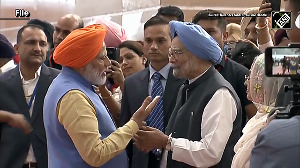The World Economic Forum's Global Information Technology Report 2004-05 released on Wednesday stated that outsourcing, which offered strategic and economic benefits to companies, was fast moving from peripheral activities to core areas like manufacturing, customer management and information technology.
If it worked, outsourcing helped companies reduce costs, increase flexibility, enhance expertise, boost discipline, and provide the freedom to focus on core business capabilities, said Mark Melford, Miles Wright and Suvojoy Sengupta of Booz Allen Hamilton in their paper, "Next Generation IT Outsourcing: Profits or Perils".
On the flip side, there were instances of outsourcing decisions going wrong, the report said, adding, as suppliers became closely integrated to the company's basic business operation, the risk of failure escalated.
As an area of economic activity, outsourcing had become a multi-billion dollar industry and there was the real possibility that not only was it going to stay but also expand quickly in the coming years, the report said.
Driven by the rapid reduction in cross-border communication costs, outsourcing was expected to have a tangible impact on the business environment of companies.
On IT outsourcing, the report said it was becoming so close to "core" that it was becoming a strategic choice.
"IT outsourcing is now a developed market where global suppliers are offering differentiated and more flexible service propositions, resulting in increased complexity of the procurement process and relationship models. Outsourcing in general and IT outsourcing in particular were thus increasingly not just make-or-buy decisions, they were make-or-break decisions," the report said.
The report showed a strong link between the investment in ICT and a nation's productivity.
According to the International Monetary Fund's Markus Hacker, who was part of the team that drafted the report, some of the countries posting the highest productivity gains were in the low-income category and it was concluded that trade barriers or the lack of it were vital for the spread of ICT in low-income countries.
The report also called for a new regulatory framework for telecommunications in the 21st century in the context of developments like the growth of broadband access and the growth of voice-over-Internet protocol, which were changing the structure of the industry.
While the traditional regulatory framework addressed the issues of price competition in monopolistic markets in fixed telephony and data, the survey called for a new, organised approach towards telecom regulation.
The report also highlighted Taiwan, which had a population of just 22 million people but produced more than half of the hardware required by the worldwide ICT industry. Technology-intensive industries accounted for over half of Taiwan's economy, against a quarter in the 1980s.







 © 2024 Rediff.com -
© 2024 Rediff.com -